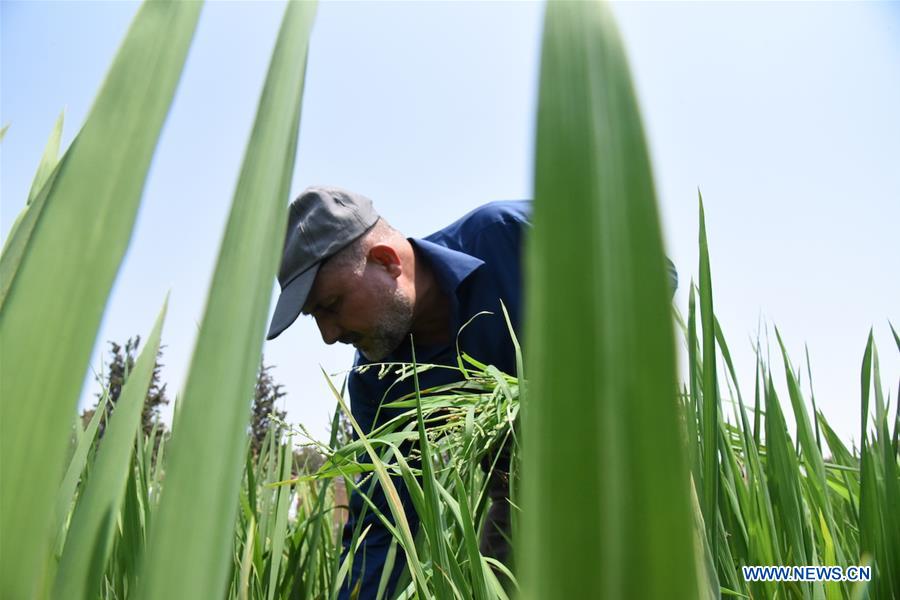
Samir al-Ahmad, chief of Zahid Water and Irrigation Research Station, checks on the ears of upland rice at a paddy field in Syria's northwestern province of Tartous on July 28, 2020. In its initial experimental stages, the cultivation of upland rice has shown promising results in Syria and could potentially offer good economic value for the country that is an importer of rice and under economic sanctions. (Photo by Hummam Sheikh Ali/Xinhua)
by Hummam Sheikh Ali
TARTOUS, Syria, Aug. 31 (Xinhua) -- In its initial experimental stages, the cultivation of upland rice has shown promising results in Syria and could potentially offer good economic value for the country that is an importer of rice and under economic sanctions.
Syria imports all of its needs of rice in hard currency, since there is no flooded rice field in the country due to a lack of water resources.
Unlike the lowland rice that is grown in flooded fields, upland rice is grown on dry soil. The studies of the upland rice started in 2008, while in 2010 the field experiments started in the Euphrates Basin in northern Syria.
In 2015, the project was moved to Akkar Plain in the countryside of Tartous province in northwestern Syria as the climate and soil, as well as humidity, are suitable.
The experiment, which was a comparison between 19 types of upland rice, continued for five years by the government-run Zahid Water and Irrigation Research Station.
In the final stage of the experiment, the research reached a conclusion of choosing four different types of upland rice that were compatible with the Syrian soil in Akkar Plain.
In 2020, this experiment was cultivated in a stretch of land with the aim of multiplying the four approved seeds, Samir al-Ahmad, the chief of Zahid Water and Irrigation Research Station, told Xinhua.
He said the rice will soon be harvested and the rice seeds will be handed over to a seed establishment called Ikthar. Afterward, the seeds will be delivered to farmers to start planting the upland rice in their lands in Akkar Plain by 2021.
In two years' time, if the results were successful the seeds will be planted in other areas in the country, he said.
He said if the project was completely successful, it could bring economic benefit to the country and save foreign currency spent on rice imports.
He said that with the development of the upland crops, "we could cover up to 50 percent of the rice imports and this is a good thing because any saving will be good and in the interest of the country."
Al-Ahmad further said that the price of the upland rice will be more affordable for the Syrians when it finally finds its way to the shelves of the stores.
He said both the cost of unpeeled rice and the processed rice will be almost half of what the Syrians are currently paying for the imported rice.
Meanwhile, al-Ahmad pointed out to obstacles facing the project, mainly the lack of equipment for rice milling, which is a crucial step in the processing of rice.
"If the production of farmers is big, the already-existing machines will not be enough," he said.
Another problem, the expert continued, is that the research station uses the drip irrigation system in the testing of the four seeds and this specific system may not be available in the lands of the farmers.
"Maybe the farmers are unable to set up this irrigation system and will have to find other compatible methods," he said, adding that the upland rice crops are planted in the summer so the farmers cannot benefit from the rainwater in the winter.
On the bright side, al-Ahmad said that from their observation, there will be no problem with the water in Akkar Plain for further testing in the farmlands of the farmers.
He further said that some university students are presenting prototypes of machines that could be used for rice milling.
In three years' time, Syrian could possibly have the upland rice on their dining tables, he expected. Enditem



